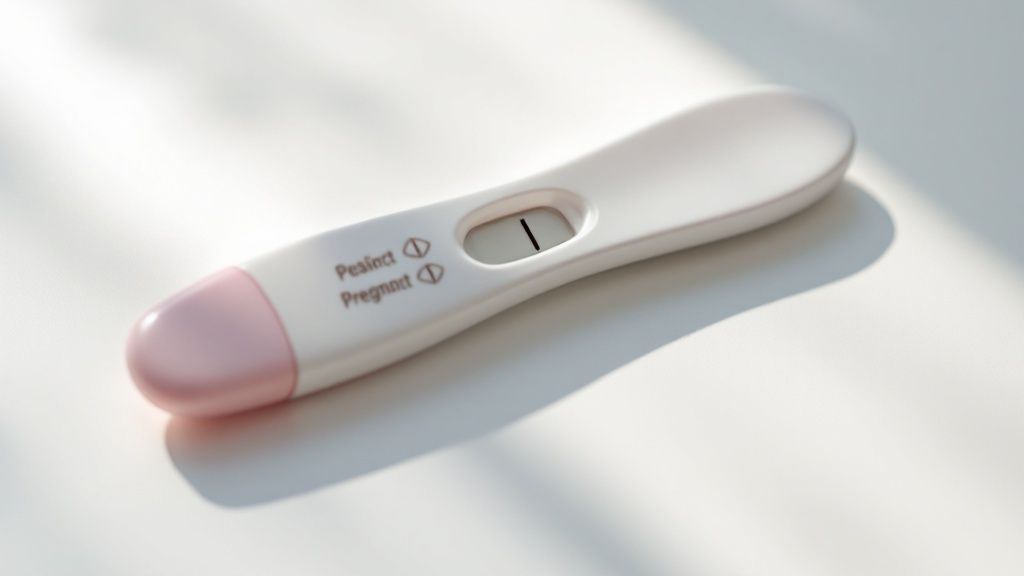
Recognizing the early signs of pregnancy can be thrilling yet uncertain. These initial indicators are often subtle and easily confused with premenstrual symptoms. Therefore, understanding what to look for is key. This post will overview common early pregnancy signs and their typical timing. Remember, this information is for general knowledge only and does not replace professional medical advice. Always consult with a healthcare provider for confirmation and personalized guidance.
A missed period is often the first noticeable sign of pregnancy. This happens because of the rise in human chorionic gonadotropin (hCG), a hormone produced after implantation. However, stress, hormonal imbalances, and other factors can also cause a missed period. For instance, significant weight changes or intense exercise can disrupt the menstrual cycle. This means a missed period, while suggestive, isn’t a definitive sign of pregnancy.
In addition to a missed period, early pregnancy often brings a wave of physical and emotional changes. Tender breasts, fatigue, and nausea, commonly known as “morning sickness,” are frequently experienced. These symptoms are generally attributed to the hormonal shifts occurring within the body. Morning sickness, for example, can range from mild queasiness to more intense bouts of vomiting and, despite its name, can occur at any time of day. These changes can begin just a few weeks after conception, making them important early clues. The intensity of these early signs varies greatly from woman to woman, with some experiencing them strongly while others hardly notice any changes at all. This variability is entirely normal. We’ll explore these physical and emotional changes in more detail in the following sections.
Physical Signs

As previously mentioned, early pregnancy often triggers a cascade of changes. These physical manifestations, driven by hormonal shifts, can be some of the first hints that you might be pregnant. Understanding these physical signs is an important step in this journey. Let’s delve into some of the most common physical experiences in early pregnancy.
Missed Period: A Key Indicator
A missed period is often the most recognized early sign of pregnancy, frequently prompting women to suspect pregnancy and take a pregnancy test. This halt in menstruation occurs because the developing embryo releases hCG, signaling the body to maintain the uterine lining. It’s important to remember, though, that factors like stress or changes in routine can also disrupt the menstrual cycle. For instance, sudden weight gain or loss can mimic a missed period. Therefore, a missed period is a valuable clue but not a definitive confirmation.
Breast Changes: Tenderness and Swelling
Many women experience noticeable breast changes shortly after conception. These changes, including tenderness, swelling, and a feeling of fullness, are linked to the hormonal shifts of pregnancy, especially estrogen and progesterone. Imagine your breasts as sponges absorbing these hormones, leading to increased sensitivity. The areola, the area around the nipple, may also darken and widen. These changes can begin as early as one to two weeks after conception, even before a missed period. While similar breast tenderness can occur premenstrually, pregnancy-related tenderness is often more pronounced and persistent. This persistent discomfort can be a key differentiator for many women.
Fatigue: An Overwhelming Tiredness
Another common physical sign of early pregnancy is an overwhelming sense of fatigue. This exhaustion can feel different from typical tiredness and often sets in early in pregnancy. This is largely due to increased progesterone levels, a hormone vital for maintaining the pregnancy. Progesterone can have a sedative effect, increasing drowsiness. Moreover, the body is working hard to build the placenta and increase blood volume, adding to the exhaustion. As a result, this fatigue can be intense and persistent, even after a full night’s sleep.
Implantation Bleeding: A Slight Spotting
Some women experience light spotting or bleeding, known as implantation bleeding. This occurs when the fertilized egg implants into the uterine lining, typically 6 to 12 days after conception. This bleeding is usually much lighter than a normal period and may appear pinkish or brownish. While it can be easily mistaken for a light period, the timing and lighter flow are key distinctions. If you experience bleeding around your expected period that is significantly lighter than usual, it might be implantation bleeding. However, it’s always recommended to consult your healthcare provider if you have concerns about any bleeding.
These physical changes are common in early pregnancy and often contribute to the growing suspicion of pregnancy. Remember, the experience of early signs is highly individual. While some women vividly experience a combination of these symptoms, others may notice only subtle changes, or none at all. This is perfectly normal. These initial physical signs serve as valuable clues, prompting further investigation through home pregnancy tests and, ultimately, confirmation from a healthcare provider.
Emotional Changes
The surge of hormones during early pregnancy doesn’t just affect your physical body; it significantly impacts your emotional state as well. These emotional shifts can be just as dramatic as the physical ones, and understanding them is a critical part of navigating early pregnancy. These changes, while sometimes challenging, are a normal part of the process. This section will delve into the common emotional experiences you might encounter in the early stages of pregnancy.
Mood Swings: From Joy to Tears
Mood swings are one of the most common emotional changes during early pregnancy. One minute you might be overjoyed, and the next, find yourself tearing up at a commercial. These rapid and often intense shifts can feel like an emotional rollercoaster. This is primarily due to fluctuating hormones, particularly estrogen and progesterone, which influence neurotransmitters in the brain affecting mood regulation. These mood swings can be unpredictable and range from feelings of euphoria to irritability, anxiety, and sadness.
Increased Sensitivity: Feeling Everything Deeply
You might also find yourself feeling more emotionally sensitive than usual. Everyday occurrences that wouldn’t normally bother you might suddenly trigger strong emotional responses. For example, a sad movie could leave you sobbing uncontrollably, or a minor disagreement might feel like a major conflict. This heightened sensitivity is also linked to hormonal changes. It’s as though your emotional responses are amplified, making everything feel more intense. This increased sensitivity can be both a positive and negative experience, deepening your joy but also making you more susceptible to feelings of sadness or frustration.
Anxiety and Worry: A Natural Response to Change
Early pregnancy is a period of immense change, both physically and emotionally. It’s perfectly natural to experience some anxiety and worry during this time. You might worry about your baby’s health, the changes in your body, or the adjustments you’ll need to make to your life. This is a perfectly normal response to such significant life changes. However, if anxiety becomes overwhelming or interferes with your daily life, it’s important to reach out for support. Talking to your healthcare provider, a therapist, or a trusted friend or family member can help you manage these feelings and navigate early pregnancy with more confidence.
Digestive Changes

Alongside the physical and emotional changes, early pregnancy can also significantly impact your digestive system. These changes, while sometimes unpleasant, are a common part of the early signs of pregnancy and are typically caused by the surge in hormones. Understanding these digestive changes can help you manage them more effectively and navigate this exciting, yet often challenging, period.
Nausea and Vomiting (“Morning Sickness”)
Perhaps the most well-known digestive change during early pregnancy is nausea and vomiting, commonly called “morning sickness.” Despite the name, these symptoms can occur at any time of day or night. For instance, some women primarily experience nausea in the evenings, while others experience it throughout the day. This symptom is largely attributed to rising hCG levels. It’s believed the rapid increase in hCG can irritate the stomach lining. While the exact cause of morning sickness isn’t fully understood, hormonal fluctuations play a significant role.
Food Aversions and Cravings
Another common digestive change is the development of food aversions and cravings. You might suddenly find certain foods repulsive, even foods you once loved, while craving unusual combinations or foods you previously disliked. This can be puzzling, but it’s a normal part of early pregnancy. A woman who once enjoyed coffee might find its smell unbearable, for example, while developing a sudden craving for pickles and ice cream. These shifts in taste are also attributed to hormonal changes, although the exact mechanisms aren’t fully understood. One theory suggests aversions protect the developing fetus from potentially harmful substances during this vulnerable stage.
Changes in Bowel Habits
Hormonal fluctuations can also impact your bowel habits. Increased progesterone levels can slow down digestion, leading to constipation. This can be further exacerbated by increased iron intake from prenatal vitamins. In addition, the growing uterus can put pressure on the intestines, contributing to these changes. To alleviate constipation, drink plenty of water, eat fiber-rich foods like fruits, vegetables, and whole grains, and engage in regular physical activity, as approved by your healthcare provider. These simple changes can often make a significant difference. However, if constipation becomes severe or painful, it’s essential to consult your doctor.
Heartburn and Indigestion
Heartburn and indigestion are also common digestive complaints during early pregnancy. Progesterone, which relaxes the valve between the esophagus and stomach, is often the cause. This allows stomach acid to flow back up into the esophagus, causing the burning sensation known as heartburn. Eating smaller, more frequent meals, avoiding trigger foods like spicy or fatty dishes, and elevating your head while sleeping can often help manage these symptoms.
These digestive changes can range from mild to severe and vary significantly among women. While they can be uncomfortable, they are generally a normal part of early pregnancy. If you’re concerned about any of these symptoms, or if they are interfering with your daily life, discuss them with your healthcare provider. They can provide advice, reassurance, and strategies to help you manage these digestive challenges and ensure a healthy, comfortable pregnancy.
Sleep Changes
Following the significant digestive and emotional shifts we’ve discussed, it’s important to understand how early pregnancy can affect your sleep. These sleep changes, while sometimes frustrating, are a normal part of early pregnancy and are often attributed to hormonal fluctuations. Understanding these changes can help you manage them and ensure you get the rest you need.
Fatigue and Exhaustion: The Early Pregnancy Sleep Thief
One of the most noticeable early signs of pregnancy is overwhelming fatigue. This exhaustion can feel distinct from normal tiredness and often begins very early in pregnancy, sometimes even before a missed period. This is primarily due to the surge in progesterone, a hormone crucial for maintaining pregnancy. Progesterone’s sedative effect can make you feel drowsy and increase your need for sleep. This fatigue can be particularly intense during the first trimester and often improves in the second trimester.
Insomnia: The Frustrating Flip Side of Fatigue
While fatigue might make you feel constantly tired, it can paradoxically also cause insomnia. This might seem contradictory, but hormonal changes, coupled with physical discomfort and anxiety, can make it difficult to fall asleep and stay asleep. For example, frequent nighttime bathroom trips, due to increased blood volume and pressure on the bladder, can disrupt your sleep. Additionally, the emotional changes of early pregnancy, including mood swings and anxieties, can make it challenging to quiet your mind and fall asleep.
Vivid Dreams and Nightmares: A Common Pregnancy Quirk
Another sleep-related change you might experience is an increase in vivid dreams and nightmares. This can be unsettling, but it’s a relatively common occurrence. These intensified dreams are likely linked to hormonal changes and increased emotional sensitivity. Your dreams might be more intense, strange, or emotionally charged than usual. While this can be both fascinating and unnerving, it’s generally considered a normal part of early pregnancy.
Changes in Sleep Position: Finding Comfort as Your Body Changes
As your pregnancy progresses, you might find your usual sleep positions become uncomfortable. Sleeping on your stomach becomes increasingly difficult as your belly grows, and even sleeping on your back might become less comfortable due to pressure on major blood vessels. This often leads women to sleep on their side, particularly the left side, which is believed to improve blood flow to the baby. This change in sleep position can take some getting used to, and you might need to experiment with pillows and bolsters to find a comfortable and supportive position.
These sleep changes can require significant adjustment during early pregnancy. While challenging, understanding they are a normal part of the process can be reassuring. Practicing good sleep hygiene, such as creating a relaxing bedtime routine, avoiding caffeine and alcohol, and ensuring your bedroom is dark, quiet, and cool, can help improve your sleep quality. If you’re struggling with significant sleep disturbances, talk to your healthcare provider. They can offer personalized advice and support to help you manage these challenges and get the rest you and your baby need.
When to See a Doctor

Experiencing early signs of pregnancy can be both exciting and anxiety-provoking. While these signs can be strong indicators, they don’t offer definitive proof. This leads to the important question: when should you see a doctor to confirm pregnancy and begin prenatal care? Prompt medical consultation ensures you receive the appropriate guidance and support for a healthy pregnancy.
Confirming Your Pregnancy: Beyond the Home Test
A home pregnancy test can provide an initial indication, but it’s essential to have your pregnancy confirmed by a healthcare professional. A missed period, combined with other early signs like nausea or breast tenderness, definitely warrants a doctor’s visit. A doctor can perform a more sensitive blood test to detect hCG, providing more accurate confirmation. This confirmation also marks the beginning of your prenatal care, essential for monitoring your health and your baby’s development.
Timing Your First Prenatal Appointment
Ideally, schedule your first prenatal appointment as soon as your pregnancy is confirmed by a doctor, typically around 8 weeks after your last menstrual period. This allows for the early initiation of prenatal care, which is crucial for identifying any potential risks or complications. For example, early prenatal care can help detect conditions like ectopic pregnancy, where the fertilized egg implants outside the uterus, or gestational diabetes. Early detection allows for timely intervention and better management of these conditions.
Recognizing Potential Complications: When to Seek Immediate Care
While many early pregnancy symptoms are normal, some require immediate medical attention. Therefore, knowing when to seek urgent care is vital. Severe or persistent abdominal pain, heavy bleeding, or a high fever, for example, could indicate serious problems like miscarriage or ectopic pregnancy. Intense, unrelenting nausea and vomiting that prevents you from keeping down any food or liquids could signify hyperemesis gravidarum, a severe form of morning sickness. These symptoms should never be ignored and require immediate medical evaluation.
Ongoing Prenatal Care: A Roadmap for a Healthy Pregnancy
Your first prenatal appointment is just the start. Ongoing prenatal care throughout your pregnancy is essential for monitoring your health, tracking your baby’s development, and addressing any concerns. Regular check-ups will become part of your routine. These appointments provide a space to discuss your symptoms, manage any discomfort, and receive guidance on nutrition, exercise, and other important aspects of a healthy pregnancy. They also offer opportunities to ask questions, address anxieties, and develop a strong relationship with your healthcare provider. This ongoing support plays a vital role in ensuring a healthy and positive pregnancy experience.
Establishing a Supportive Network: Beyond Medical Care
Navigating early pregnancy and the subsequent months can be overwhelming. Building a supportive network of family, friends, or even online communities can offer invaluable emotional and practical support. Sharing your experiences and concerns with others who understand can ease anxieties and foster a sense of community. Resources like TangoFamily offer a wealth of information and support on pregnancy, parenting, and family life. Remember, you are not alone on this journey, and seeking support is a sign of strength. These steps will help you navigate the joys and challenges of pregnancy with confidence and peace of mind.
Conclusion
From the very first missed period to the subtle shifts in your mood and energy levels, the early signs of pregnancy can be a mix of excitement and uncertainty. We’ve explored a variety of these early indicators, from the classic physical symptoms like breast tenderness and morning sickness to the less obvious emotional and digestive changes. Understanding the potential range of these early signs empowers you to be more attuned to the changes within your body.
Listening to Your Body: The First Step
Recognizing these early signs isn’t just about confirming a suspected pregnancy; it’s about connecting with your body and understanding the incredible transformations taking place. The fatigue you experience, for example, isn’t just tiredness; it’s your body working hard to nurture new life. Similarly, mood swings aren’t just random emotional fluctuations; they reflect the powerful hormonal shifts preparing your body for motherhood. This deeper understanding can transform the experience of early pregnancy from a confusing time into one of profound connection with your changing self.
Empowerment Through Knowledge: Taking the Next Steps
While this exploration of early signs offers valuable insights, remember that each woman’s experience is unique. Some experience these signs vividly, while others barely notice them. However, if you suspect you might be pregnant, taking a home pregnancy test is an important next step. A positive result should be followed by a visit to your healthcare provider to confirm the pregnancy and begin prenatal care. Taking proactive steps toward confirmation and professional guidance is essential for a healthy and informed pregnancy journey. Resources like TangoFamily can provide ongoing support and information throughout your pregnancy and beyond. From navigating the early signs of pregnancy to understanding the nuances of parenting, TangoFamily offers valuable resources and expert advice to support you on your journey.
Ready to start this exciting new chapter? Visit TangoFamily today at https://www.tangofamily.com/ and discover a wealth of information and support for pregnancy, parenting, and family life.
